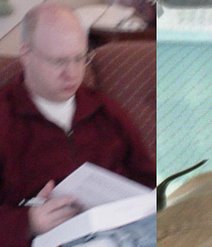I am hearing the question, or rather the affirmative answer, coming up from a lot of places right now.
Rabbi Avi Lipkin, for instance, thinks Judaism = good; Christianity = good; Islam = evil, evil, evil. At school my friend Silas is convinced that Muslims are unknowingly worshipping Satan. Read
his letter to the editor of his undergrad paper to get a feel for who he is. Even when I disagree I really enjoy letters like this. Most recently,
Derek told me he's convinced that Islam is demonic. (I was supposed to play lead guitar with Derek at
Bobfest this weekend, but my wife's grandfather died a couple days ago, so we will be traveling to the funeral this weekend instead.)
So concerning Islam, I am just a little uncomfortable with what seems to be the party line among my friends. I want to at least express some reasons for being uncomfortable.

Ten years ago, my wife and I spent two weeks in Israel. Two sites in Jerusalem struck me in particular, and in a way they seem to serve as metaphors for religion. The first site was the church of the Holy Sepulchre.
This is a picture of the inside the church. The church is built over the site traditionally associated with Jesus' crucifixion, preparation for burial, and burial site itself. It is one of the most spiritually oppressive places I have ever visited. There is only one entrance/exit to the church, so one can easily feel "trapped" after entering. The entire building is dark. The air is thick and stale, as if layers and layers of incense have never fully dissipated but continue to linger for months. At the spot that is thought to be the site of crucifixion, people were on their knees to touch and even kiss a rock in the ground. I'm not sure if it is the inappropriate veneration of the saints and relics (which I can't help but view as idolatry) or the morbid fascination with the torture and crucifixion of Jesus, but the place just gave me the creeps. I felt like I was walking into a den of religious demons.

The second site was the Dome of the Rock, pictured here. In contrast to the Church of the Holy Sepulchre, the Dome was bright, it was peaceful. In the middle was a rock - an ugly rock, to be sure, but just a rock. Nobody was kissing it or touching it to gain indulgences or transferred holiness or any such drivel. I thought to myself, if I had to pick one of the two places to pray for an hour, the Dome wins hands down. I was quite surprised since I had always bought the party line that Islam was pure evil.
What does it prove? Nothing directly, I suppose. But I have to consider this fact: Observant Muslims pray and worship several times daily to the creator of the Universe
as the creator of the Universe. Even if their conception of
who that creator is is vastly mistaken, would not the creator of the Universe receive their worship? And even if they have a radically different understanding of the character and attributes of the creator God than I do, would not the same creator God receive their worship just as he receives mine? Just because it is quite clear that Muslims and Christians have extremely different conceptions of God, it does not seem to follow that we worship a different God who stands behind those conceptions - it only follows that one or both of us are wrong in who we perceive God to be.
Keith Ward, in his excellent defense of religious beliefs,
Is Religion Dangerous?, says,
...education in religion should be a primary goal. By education I mean providing a reasonably balanced view of the tradition, its history and its variety, giving a fair assessment of its place in global history, and making clear the necessity of reflective and self-critical thought in religion. There are plenty of Muslims who do this. Al-Azhar University in Cairo, perhaps the most famous Muslim university, provides such and education, and its scholars are, unsurprisingly, regarded by [militant Islamic] followers of Qutb with loathing and contempt. It is important to deprive those who fear scholarship in religion of social prestige and religious status. This is another reason why, incidentally, attacks on religion by those who think it is all blind and thoughtless provide support for the fundamentalists. For such attacks undermine the possibility of reflective theological thought as effectively as the diatribes of fundamentalists.
There are all kinds of questions going on here. In my camp the most common objection is that you cannot be saved through Islam, only through Christ. Without seeking to minimize that issue, it is important to recognize that the issue of whether Islam is evil is different question entirely.





